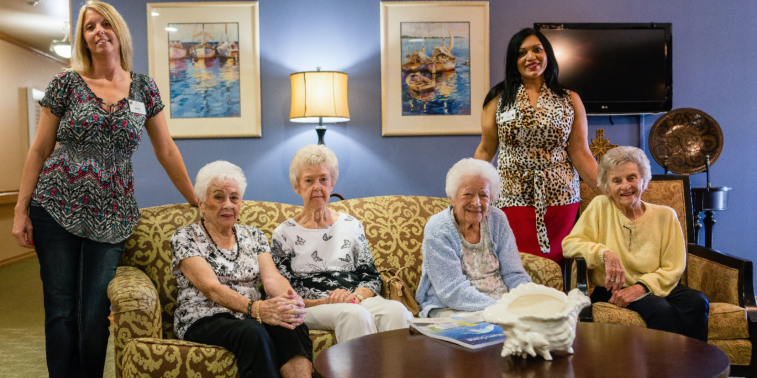Just How to Offer Meaningful and Customized Mental deterioration Care
The arrangement of personalized and significant dementia care requires a nuanced understanding of each person's one-of-a-kind history and choices. Care methods have to be customized to involve the person in means that reverberate with their previous experiences, therefore cultivating emotional links and enhancing overall wellness.
Comprehending Mental Deterioration Originality

Care carriers have to assess cognitive abilities, emotional states, and behavioral patterns to develop personalized treatment plans. This may include adapting interaction designs, employing acquainted regimens, and using meaningful tasks that resonate with the individual's previous experiences. For circumstances, engaging an individual with an enthusiasm for songs with musical activities may stimulate favorable memories and improve emotional health.
In addition, recognizing originality promotes a caring approach that respects the self-respect and autonomy of those coping with dementia. It motivates caregivers to pay attention actively, observe behavior signs, and continue to be adaptable in their caregiving approaches (charlotte care home). By prioritizing individuality, caregivers can not only enhance the lifestyle for those with mental deterioration yet additionally develop an extra profound understanding of their special viewpoints, ultimately bring about extra empathetic and effective care
Building Trust and Relationship
Developing trust fund and rapport is fundamental in dementia care, as it produces a secure and encouraging environment for people affected by the problem. Structure these connections requires regular, thoughtful communications that focus on the requirements and sensations of the individual. Caretakers should come close to communications with empathy, recognizing the distinct obstacles encountered by those with mental deterioration, including memory loss, confusion, and emotional distress.
Caregivers ought to make use of clear, straightforward language and non-verbal cues to share understanding and support. Energetic listening shows regard and validation, allowing individuals to reveal themselves without anxiety of judgment.
Knowledge with everyday activities and caregivers promotes a feeling of stability, allowing individuals to really feel even more at convenience. By doing so, caregivers strengthen the person's identification, advertising dignity and respect, eventually leading to stronger, a lot more meaningful partnerships in the context of dementia care.
Tailoring Tasks and Engagement
Engaging individuals with mental deterioration with tailored tasks can substantially improve their lifestyle and foster a much deeper link in between caregivers and those in their treatment. Personalization is necessary, as it acknowledges the distinct backgrounds, interests, and capabilities of each person. Tasks must be designed to stimulate cognitive features, promote physical motion, and motivate social communication, all while staying satisfying and meeting.
To tailor activities successfully, it is crucial to evaluate the individual's choices and cognitive capacities. In addition, including aspects of regimen can offer convenience and security, enabling people to engage with activities much more confidently.
Caretakers can improve engagement by getting involved together with the individuals, fostering a encouraging and interactive atmosphere. It is also important to remain adaptive and flexible, readjusting tasks as needed based upon the individual's power degrees and state of mind. Inevitably, meaningful engagement with tailored activities not just uplifts people with dementia however additionally enhances the caretaker relationship, advertising mutual enjoyment and understanding.
Reliable Interaction Strategies
Efficient interaction is crucial in dementia care, as it cultivates a sense of link and understanding between individuals and caretakers experiencing cognitive decline. Using efficient interaction techniques can substantially improve the quality of communications and minimize irritation for both events.
First of all, making use of simple, clear language is crucial. Short sentences and familiar words help individuals understand and react better. In addition, keeping a calmness and favorable tone can create an encouraging atmosphere, which is important for people who may really feel confused or anxious.
Non-verbal interaction plays a considerable duty too. Caretakers should take note of body language, facial expressions, and motions, as these cues can commonly share greater than words - charlotte care home. Developing eye contact and utilizing mild touch can additionally share and strengthen connections compassion
Energetic listening is look these up one more vital part. Caretakers must listen, enabling individuals to reveal themselves fully, also if their speech is unclear or fragmented. This lionizes and motivates extra open interaction.
Lastly, confirming experiences and feelings is important. Acknowledging emotions, despite their basis actually, can offer comfort and enhance the caregiver-individual partnership, promoting a much more encouraging environment.
Sustaining Family Members Participation
Household involvement plays a considerable duty in the total care and assistance of people with mental deterioration. Involving member of the family creates a collective atmosphere that boosts the top quality of treatment, cultivates emotional links, and makes sure that the one-of-a-kind requirements of the individual are fulfilled. Family participants commonly possess invaluable insights into the person's history, choices, and actions, which can be important in creating personalized treatment strategies.

Moreover, relative can be encouraged to get involved in daily treatment activities, such as engaging in meaningful discussions or assisting with familiar regimens. This not only helps suffer the individual's sense of identification however additionally reinforces familial bonds. Inevitably, by promoting an inclusive technique that values family members payments, treatment service providers can boost the overall experience for both individuals with dementia and their enjoyed ones.
Conclusion
In conclusion, providing personalized and significant mental deterioration care requires an extensive understanding of each person's special background and preferences. Collectively, these straight from the source methods add to improved quality of life for individuals with mental deterioration.
The stipulation of individualized and meaningful mental deterioration treatment needs a nuanced website here understanding of each individual's special background and choices. By doing so, caretakers strengthen the individual's identity, promoting self-respect and regard, inevitably leading to more powerful, extra purposeful connections in the context of dementia care.
Engaging individuals with dementia via tailored activities can significantly boost their high quality of life and promote a much deeper connection between caregivers and those in their care.Household participation plays a considerable function in the overall care and support of individuals with dementia. Ultimately, by fostering a comprehensive approach that values family members contributions, treatment carriers can improve the total experience for both individuals with dementia and their liked ones.